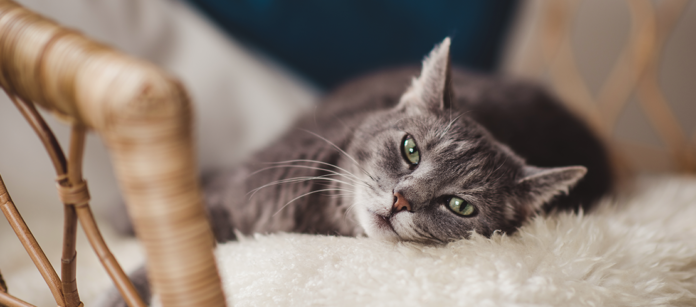Fleas commonly cause a restless, scratching, or chewing feline. Identifying and eliminating fleas on your cat and home may help relieve their itching (and protect you from them). Find out whether your cat has fleas before shelling out for expensive flea treatments for cats:
- Keep an eye out for any twitching of their fur. Little bugs bouncing around on their fur is a sure sign that fleas are a problem.
- Scrub your cat many times daily with a fine-toothed metal flea comb from head to tail. Flea adults and flea eggs will be eliminated, and the irritation they cause will be reduced.
- The fleas may be killed by dipping the comb in a solution of warm to hot water and liquid dish detergent.
Avoiding Fleas
Fleas would love to make a home in your cat because of its warm, velvety coat and rich blood supply. Use a flea collar or spray to keep the little critters away from your pet. You may choose from several distinct styles, including:
- Materials for applying to your cat: When compared to everyday household products like dust, shampoos, and sprays, spot-on treatments do better in terms of safety, convenience, and efficacy. They are available from any vet or online. Consult your vet about your cat’s best application method, dosage, and frequency. Make sure the therapy is safe for cats by reading the label before administering it.
- Medications: Your cat’s adult flea population will be eradicated within 30 minutes after administering the proper tablet. However, it does not have any long-term consequences. The flea-killing chewable medication also works quickly to prevent fleas from reproducing. Using it for a month can help keep flea eggs from hatching.
Get Rid Of The Fleas
During her lifetime, a female flea may produce up to 50 eggs. You don’t have to worry about them being scratched up when your cat rolls onto your carpet, sofa, or blanket. If you let them develop into adults, you will have a severe flea problem. You may fix the issue by giving your house a good cleaning:
- Regular vacuuming is a must: Get rid of any potential nesting areas by vacuuming the carpets, upholstered furniture, and floor crannies. Live fleas will be eliminated with their dead counterparts. After you’re done, remember to either toss away the vacuum bag or wash the canister in warm, soapy water.
- Perform a wash once a week minimum: If your pet has been on the mattress, couch, or any other fabric, remove it and wash it immediately. Do your laundry in hot water to ensure no insects are left behind.
Effectively Managing Persistent Flea Problems
Stubborn fleas that refuse to go may need more treatment: It’s time to make some room. Everyone must leave home, including the dogs, so the flea spray must be applied to the carpets and other surfaces. Citrus-based sprays are chemical-free alternatives for the environmentally conscious homeowner. No one should go near the area until everything has dried, including dogs and youngsters. Get flea medicine for all of your pets. You’ll never be able to get rid of fleas if you don’t treat all of the pets in the area. Fleas will triumph unless all of your pets are treated.
Conclusion
Get in touch with a professional who can offer you the appropriate flea treatment for cats. You may need to call in a professional pest controller if fleas persist. Fleas, even when en masse, are tiny and straightforward to eliminate. After a few weeks of diligent cleaning, you and your cat should be annoyed. Nevertheless, a comprehensive cleanup may take up to three months. So, begin today!


